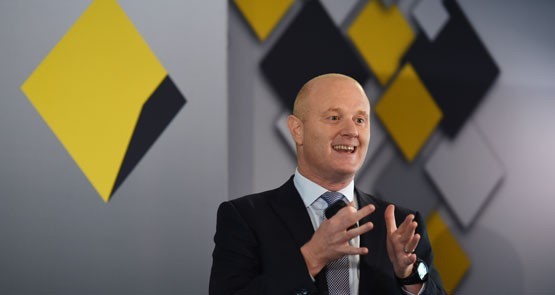
Commonwealth CEO and MD Ian Narev
Just in case there was any conjecture as to which Australian companies are the most appalling institutions, last night’s Four Corners once again did a fine job of allaying those doubts. In a scene reminiscent of Clarke and Dawe, Commonwealth Bank’s multimillion-dollar CEO, Ian Narev, with a straight face, repeatedly claimed that customers were the bank’s highest priority all the while the bank was dubiously refusing to pay insurance claims to terminally ill customers. CBA even allegedly refused to make a payment to a former employee it deemed too ill to work, but not ill enough to receive their claim. This kind of incompetent corporate behavior could almost be funny if, you know, people’s lives weren’t being ruined and all.
To be sure, Four Corners and Fairfax almost certainly highlighted the most egregious cases, but this is hardly the Commonwealth Bank’s first offence. Two years ago Australia’s largest financial institution was embroiled in one of Australia’s worst ever corporate scandals: a gigantic financial advisory fraud that lasted a decade (and that the bank spent years denying, covering up and lying about). Meanwhile, earlier this year, former CBA employees were charged with a $76 million fraud involving an alleged Ponzi scheme at the bank that was ignored for five years until the police got involved.
Narev has been paid a great deal to look after the bank’s customers; in just four years, Narev has been paid $29.7 million.
In fairness to Narev, he isn’t the only highly paid bank CEO whose bank is making headlines for the wrong reasons. New ANZ boss Shayne Elliott has retreated from long-time CEO Mike Smith’s legacy of a pan-Asian financial institution.
Within weeks of his appointment, Elliott quietly backed away from Smith’s much-vaunted Asian growth story. By February, Elliott stated that Asian trading was “difficult” and that the bank’s bad debt charge for Asia would be $800 million (above market estimates). Analysts warned that the bank might even be required to undertake a dilutive capital raising if asset quality continued to deteriorate. The Asian expansion was Smith’s legacy, and he spent almost his entire tenure growing ANZ’s Asian business. CEOs of large institutions, like banks, are essentially paid to efficiently allocate capital and define a culture — a role that raises questions for both Smith and Narev.
Fortunately for Smith, the strategy seems to have fallen apart after his departure, and not before he was paid $82 million by ANZ shareholders (who have now seen the bank’s share price slump by 19% since October 2007, when Smith was appointed).
The performance of the large Australian banks like CBA and ANZ is even worse when you consider they are essentially backed by Australian taxpayers, courtesy of an implicit government guarantee (the big four banks are most certainly too big to fail). As The Australian’s fantastic Adam Creighton explained, virtually all of CBA’s $9 billion profit last year came courtesy of Australian taxpayers.
So just to sum up — bank shareholders and taxpayers pay bank executives literally hundreds of millions of dollars — and what do they get for it? Nice work if you can get it.








[“Too big to fail”?]
How much is Narev being paid to oversee this “cat-and-mouse/catch us if you can/profit at any cost” BS culture?
How much is PR going to cost share-holders to fix this latest f**k-up?
And where are the (other?) people – further down the chain (presumably) – responsible for it? If they’re still with the bank – why and how much are they “earning”?
Go after them Adam.
The real crime, the great crime, is the pay that senior execs extract at no risk, while effectively doing nothing.
How hard would it have been for Narev to just fix this. Would have taken about 10 minutes and an email.
Profits before people. That should be every banks slogan.
Apart from Narev claiming the cases were ‘disturbing’ he appeared to be reading from the corporate training manual ie: how much CBA values their customers & strives to deliver good service etc.
The usual empty chorus.
Foolishly, I was waiting for him to show some gumption & leadership by saying he would review policy requirements & revise management culture to ensure all legitimate claims were honoured. But it must be difficult for some CEOs to utter the word ‘honour’.
“CEOs of large institutions, like banks, are essentially paid to efficiently allocate capital and define a culture”
I rather think that they are paid very large bonuses to meet their KPIs, commonly based on turnover, profitability and takeovers.
So that is what they maximise. Who is surprised?
If we guaranteed depositors money and let the banks largely fall over when the next GFFU occurs, what would this country lose out on? For years our financial bushrangers have told us that churning out billions from usurious margins and ridiculous fees and charges, is good for our economy and that their scams make up some sort of industry.
At the very least we need caps on bank charges and massive taxing of windfall profit. The banks and their fellow travellers are choking the world’s economy.